Horses were highly prized in ancient Irish culture. Deference for our equine companions continues to this very day.
Both Ireland and Kentucky, my two homes on either side of the Atlantic, are renowned for breeding magnificent racehorses. So I thought it was high time I explored the connection between the Irish and horses by taking a look at the wisdom in some old Irish sayings about horses.

Table of Contents
- Irish Words of Wisdom
- When Did Horses Arrive In Ireland?
- Cú Chulainn's Mighty Steeds
- Enbarr of the Flowing Mane And the Great Celtic Sea God Manannán Mac Lir
- King Connor Mac Nessa And Crunnchú's Wife
- Horses In Brehon Law
- The Penal Laws And Horse Ownership
- The Connemara Pony
- Horses For Farming in Ireland in Centuries Past
- More Irish Sayings and Proverbs About Horses
Irish Words of Wisdom
This collection of old Irish words of wisdom and ancient myths, in praise of our equine friends, underlines the importance of these magnificent animals to the Irish throughout the centuries.
"A tattered foal can grow into a splendid horse."
This is a fine example of how the Irish appreciate horses. It's good advice to this very day. Time can change everything.
But before we explore more of the sayings, let's first delve into a little history about horses in Ireland.
When Did Horses Arrive In Ireland?
Horses arrived in Ireland thousands of years ago. Some believe they crossed a land bridge between County Derry and Scotland at the end of the last ice age. Others now believe they swam here across this narrow strait.
The horse originated along the Asian steppes. Roaming, wild herds of horses migrated west across Europe and into Ireland either by land or by sea.
Horse remains have been found at ancient Celtic settlements at Lough Gur, County Limerick, and Newgrange, County Meath. Archaeological evidence suggests the Celts domesticated horses before 2000 B.C. Our myths and legends indicate a long history of the horse in Ireland.
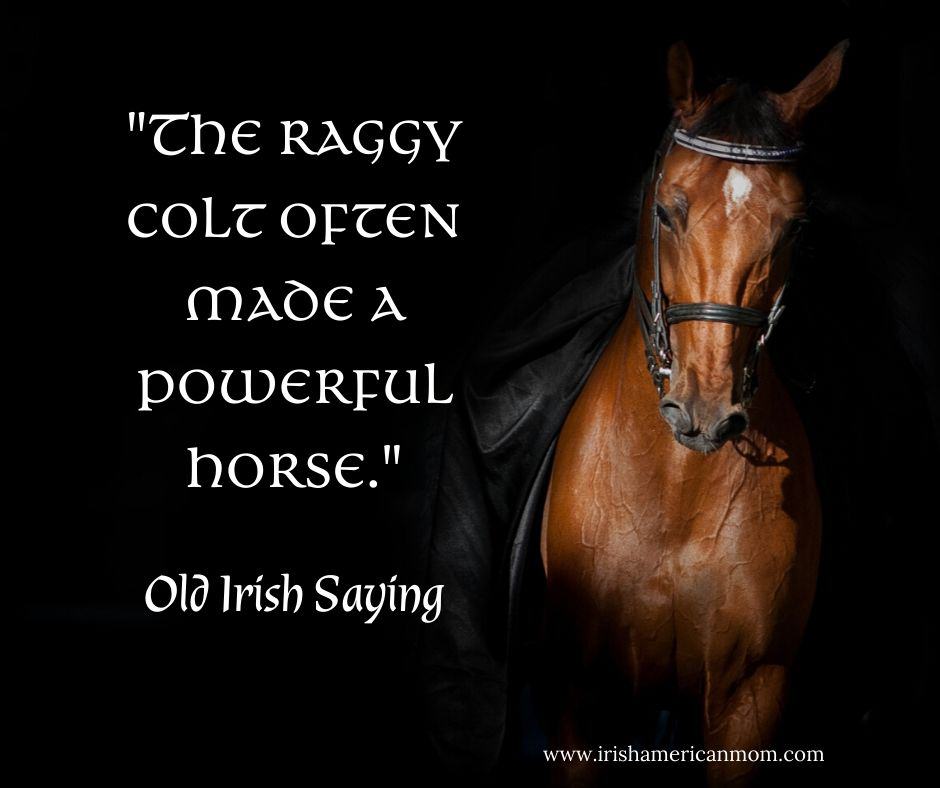
"The raggy colt often made a powerful horse."
Old Irish Saying
Cú Chulainn's Mighty Steeds
In the ancient Irish tale “The Cattle Raid of Cooley” (Táin Bó Cúailnge - pronounced 'thawn-boh-coo-in-ea), which was written as part of the Book of Leinster, the feats and accomplishments of the great Celtic warrior Cú Chulainn are recounted.
During one battle he rode a chariot pulled by two horses. These were beautiful animals, and like any good horseman, Cú Chulainn ensured they were equal in size, beauty, and speed to keep his chariot nimble.

One horse was described as grey, broad in the haunches, fleet of foot, and wild. The second horse was jet black, broad-hoofed and slender.
These two magnificent steeds were faster than any other horses found on the island. No other horseman in Ireland could keep pace with the Mighty Cú Chulainn.
Enbarr of the Flowing Mane And the Great Celtic Sea God Manannán Mac Lir
A magnificent horse, Enbarr of the Flowing Mane, is associated with the great Celtic Sea god Manannán Mac Lir. He features in Irish, Scottish and Manx mythology.
It is from Manannán that the Isle of Man (Mannin) gets its name. Many old Celtic myths and legends recount his role as a god of the Tuatha Dé Danann (the ancient, magical people of Ireland).
Stories of the Tuatha Dé have been told through generations in Ireland and other Celtic countries and were handed down through the Irish oral tradition of storytelling.
Manannán was a skilled magician with enchanting props that wielded magical powers. Enbarr of the Flowing Main his astounding horse, was said to gallop over land and sea.

King Connor Mac Nessa And Crunnchú's Wife
King Connor Mac Nessa was the High King of Ulster around the time of Christ, and features in many Irish legends. In one such story, a man named Crunnchú bragged that his wife could run faster than a horse, even the mighty steeds owned by the king himself.
Being a proud man, King Connor was tempted to execute Crunnchú for his boasting, but decided it would be better to put the poor woman to the test.
Lo and behold wasn't the poor woman pregnant at the time. She was sent to the starting line to race King Connor's horses anyway. Crunnchú’s wife was jeered and heckled by the Red Branch Knights. But fear not! She took off like lightening and left the horses in the dust.
She dropped at the finish line and promptly gave birth to twins. It turns out the woman was none other than Macha, the Celtic horse goddess.

Horses In Brehon Law
In passages of the Brehon Laws it is revealed that during the first millennium the Irish often imported horses from Wales and France. No saddle was used when riding.
Brehon Law existed in Ireland for centuries. These laws guided the lives of ancient Irish chieftains and their subjects. With the English conquest of Ireland in the early 17th century, Brehon Law was suppressed.
These laws were first committed to parchment in the 7th century. They are so called because they were devised and shared by wandering Celtic lawyers, known as the Brehons.
Here are a few interesting Brehon Laws regarding horses.
If a man took a woman off on a horse, into the woods or onto a sea-going ship, (which may have been very common back then), her family had a set amount of time to rescue her and object to her elopement or kidnapping whichever the case might be. Members of the woman's tribe had to object within 24 hours if they wished to demand payment of the fine.
I don't know if they could get the poor woman or the horse back, or just be compensated by a fine.

Horses were used to pay dowries for a bride. Under Brehon Law it was the husband-to-be who paid a bride price of land, cattle, horses, gold or silver to the father of the bride.
It was not the woman who brought a dowry to the marriage. Another interesting fact was that both husbands and wives retained individual rights to all land, animals, flocks and household goods each brought to the marriage.
And so, if a woman brought horses to the marriage, they always remained her horses. Our Celtic forebears were very advanced in their thinking.
Ancient Irish horsemen rode without stirrups. A horse was mounted by springing from the ground on to the back of the horse. This mounting method was used up until the seventeenth century in Ireland.
Every young man of the upper classes in olden days was required to learn horse-riding.
Today we require our children to learn how to read, but in the days of Brehon Law the skill of horse-riding was legally required. I thought the following saying was associated with the skill of horse back riding being a universally acknowledged skill amongst the Irish.
"Put a beggar on horseback, and he'll go at a gallop."
However, a reader pointed out that it may mean that if you give a poor beggar a chance, he’ll abuse it and take off too fast. It's similar to giving something of value to someone who does not appreciate the value of it, then they treat it with little respect.
The Penal Laws And Horse Ownership
After 1695 the Penal Laws were enforced against Catholics in Ireland. The Penal Laws were gradually repealed over the course of the 18th century. Of note is the law regarding horse ownership.
No Catholic was allowed to keep a horse with a value worth more than 5 Pounds. If a Protestant saw a Catholic with a horse of greater value, then he could purchase the horse for 5 Pounds.
This horrendous discrimination resulted in Irish people placing great value upon horse ownership, as is clearly evident in the next old saying.
"Sell the cow, buy the sheep,
but never be without the horse."
The Penal Code reduced the Irish Catholic population to dire poverty. They were suppressed and beaten, but these laws did not fully succeed because they had the effect of strengthening the will of the Irish to survive.

The Connemara Pony
In the West of Ireland you'll find the Connemara pony, a unique horse breed with a strong back and short muscular legs.
If you've ever been to the rocky, craggy regions in the West of Ireland, you'll understand why this little pony is perfectly suited to the wild terrain of the Connemara landscape.
This breed of Irish horse is descended from ponies brought to Ireland by the Vikings in the 8th century. Their genetic make-up was further enhanced when beautiful Andalusian horses were released from the ships of the ill-fated Spanish Armada. The horses swam to shore and took to the hills of County Galway. There they began to breed with the Viking-Irish ponies.
These ponies show the traits of their forebears - stamina and brawn. Farmers trapped the ponies on the hills, then brought them down to be tamed and trained. They served them well in days gone by.

Horses For Farming in Ireland in Centuries Past
Horses, Connemara ponies and donkeys served as the backbone of Irish rural farming families for centuries. Before tractors took over as the work horse of the Irish farm, it was horses that helped to plow the land (or plough the land as we spell it in Ireland).
Ponies and donkeys were fitted with special baskets called ‘creels.' These were used to transport turf home from the bog for the fire. They were also used to bring seaweed from the sea shore. This was the main source of fertiliser for the craggy, barren fields of the western coast.
Horses made an enormous contribution to the Irish economy in the 19th century.
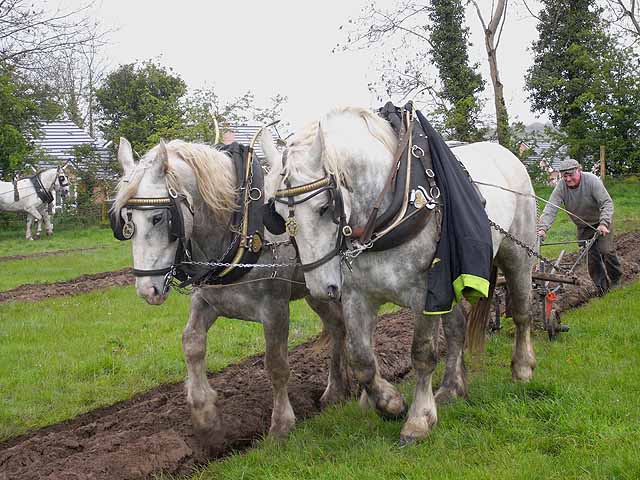
More Irish Sayings and Proverbs About Horses
Let's take a look at some additional old Irish sayings that underscore how the Irish revere and respect horses.
"It is a good horse that draws its own cart."
Horses plowed fields, thereby helping feed the population. They pulled carts, transporting people from place to place. A good horse was well trained and did not need to be led.
I'm quite certain many a drunken Irish man was taken home by a horse that knew how to draw its own cart.

"Ní dhéanfach an saol capall rás d'asal."
Pronunciation in English phonetics
= Nee yay-nock on sale cop-ull raw-se dah-sal.
"All the world would not make a racehorse from a donkey."

"Mair a chapaill agus gheobhaidh tú féar."
Pronunciation using English phonetics:
Mar, a cop-ull ah-gus gheow-hig thoo fay-ur
"Live, horse, and you will get grass."
The meaning of this saying may not be immediately apparent to many readers. Believe it or not, these words are meant to be encouraging.
It tells us that we must first survive and live, and then we will receive our reward.

Here is another old Irish horse saying:
"A nod is as good as a wink to a blind horse."

"Youth sheds many a skin.
The steed does not retain its speed forever."
Many old Irish sayings provide insights into aging and growing old.

"The best jockeys are in the stands."
Are we not all familiar with the "back seat driver," and would-be experts on everything?
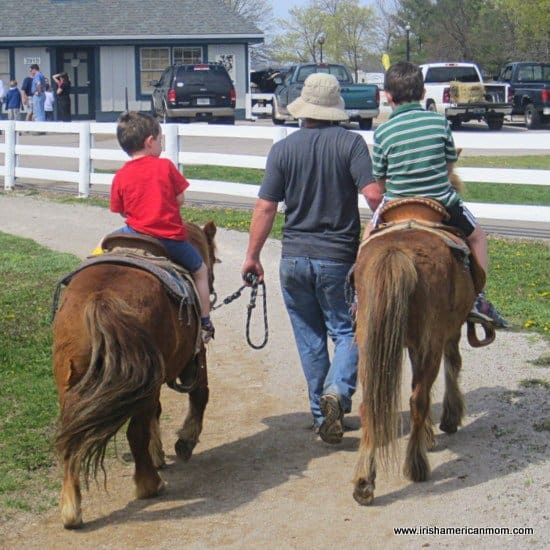
"Everyone lays a burden on the willing horse."
Our ancestors were warning us that we need to be careful and not accept too much burden, just because we are willing and able to work.

"Bíonn grásta Dé idir an dialait agus an talamh."
Pronunciation using English phonetics:
Bee-un graw-sta Day id-ur on Dee-a-lit ah-gus on thal-uv
"The grace of God is found between the saddle and the ground."
Over the course of my first twenty-two years of life, I heard many of these sayings uttered by my West Cork granny. They were part and parcel of her everyday speech. Whenever I read them now, I smile, remembering how these wonderful words of wisdom just tripped off the tip of her tongue.
I hope you enjoyed this little exploration of the Irish love of horses.
You might also enjoy my lessons in life from wise old Irish hens, and in the Blessings Section of my blog you'll find all my other ramblings about Irish sayings and blessings.
Thank you for stopping by and checking out my ramblings.

Slán agus beannacht,
(Goodbye and blessings)
Mairéad -Irish American Mom
Pronunciation - slawn ah-gus ban-ock-th
Mairéad - rhymes with parade
Here are some other recipes and ramblings from Ireland, which you might enjoy...
Why Milk Churns Remind Me Of Ireland
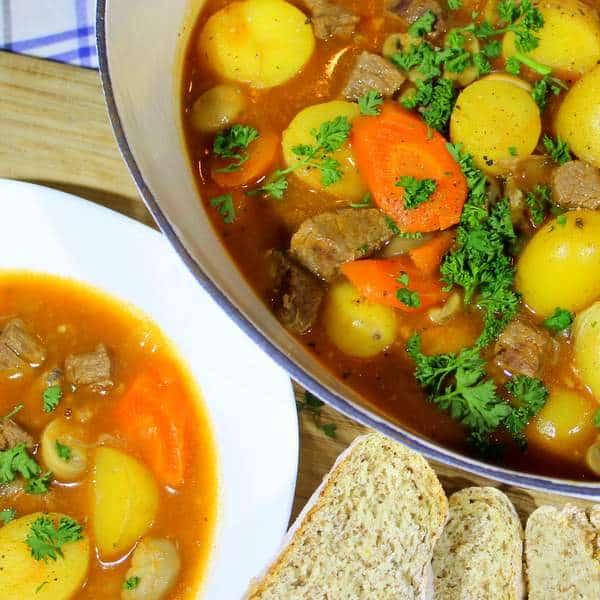



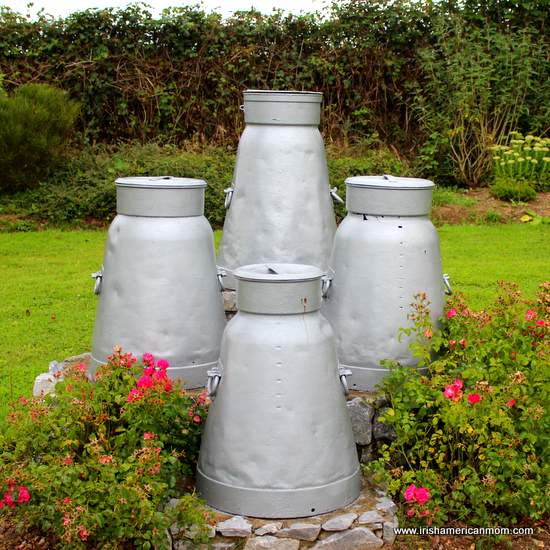
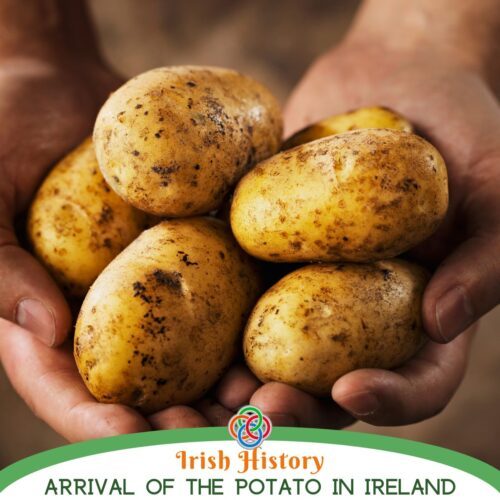











Deirdre Cunningham
I'm smiling reading this, it brings back memories of my Kerry nana & my great-aunt! x
Irish American Mom
Deirdre - I'm so glad this post brought back lovely memories for you, especially reminders of the wise old words spoken by your loved ones in Ireland.
Thanks so much for stopping by.
Mairéad
Brighid O'Sullivan
Great post as usual. And I am thrilled to know the history at the beginning of the post since I research Irish history over @Celticthoughts.com I once wracked my brain trying to figure out the earliest breed of known horses in Ireland. I know about trading but did not know Ireland traded horses with France and Wales. Thanks for that!!!
Ray Brown
Dear Brighid O' Sullivan, you have the first and last name of my grandmother from Cork. I always like to see your comments in Mairead's wonderful blogs. God Bless!
Irish American Mom
Hi Ray - The name O'Sullivan originated in Cork and Kerry. O'Sullivan Beare was one of the last Gaelic princes of the southwest region of Ireland. Brighid has a truly wonderful and authentically Irish name.
Take care,
Mairéad
Brighid O'Sullivan
Hi Ray, This is actually my pen name and I borrowed it from my great grandmother. What a coincidence. I wonder if we are related. I haven't done all the genealogy but I think she emigrated from same area as your folk. Did you know there is a museum about Blasket Island on the Dingle Peninsula in Ireland? I saw a copy of a letter of one of the Sullivans who emigrated to Springfield Massachusetts, which is close to where my relatives are from so I'm pretty sure that is the area. The museum is great. Do you know about Blasket Island? I should write a post about it one day.
Ray Brown
Dear Brighid,
My grandparents all died before I was born and my grandmother with with your beautiful great grandmother's name died in childbirth after having many children. She was born and raised in Cork, but died in San Francisco. (I have a sister who was married before I was born) and as a girl my sister met our grandmother's older sister whose name was Margaret O' Sullivan. Even if we are not directly related , we still are in the same clan. I think every year, some clans from the diaspora come from around the world to Ireland to meet up with their clans. I have never done this but it remains a great idea.
You asked me if I have ever been to the Blasket Islands and I have to say I never made it there although I have been to the Dingle Peninsula. I have only made it to three islands. I have been to Skellig Island, west of Kerry, Inishmaan Island near Galway Bay, and Achill Island near County Mayo. If you have anymore questions about my grandmother you can email me at: raybrowncork26@gmail.com God Bless
Brighid O'Sullivan
Hi Ray, I am wondering if you live in Ireland, yourself? So sad you didn't get to meet your grandmother and for her to die that way equally as sad. I am reading that healthcare in Ireland still has some challenges today; long waiting times for a room in hospitals and ambulances that take much too long to get to people! I am so grateful that my great grandmother came to the U.S. She gave all her descendents opportunities that are boundless. I am also fortunate to be able to visit her native country as well as live in an age where it is so easy to find out the history of my past. And Ray, you're a very brave soul to go to Skellig Island. I don't think I will brave that one.
Irish American Mom
Brighid - I have not been to Kerry in over 20 years. Next time I make it there I must visit the Blasket Island museum. It sounds intriguing.
All the best,
Maireaf
Irish American Mom
Brighid - I'm delighted this post was able to expand on the information you already had about trading and horses in Ireland. I discovered that little fact on a Library Ireland page. Here's the link if you would like more information:
http://www.libraryireland.com/SocialHistoryAncientIreland/III-XXIV-3.php
Best wishes for 2015, and thanks for checking out this post.
Mairéad
Brighid O'Sullivan
Thanks Mairead, You know that 6th photo you have on this post of the painted horse? We have horses just like that here in Victor, New York. Here is one in a small park near my house. That's Western NY not NY City. What a funny coincidence. I wonder who the artists are.
Irish American Mom
Hi Brighid - Louisville has many painted horses around its streets and sidewalks. Here's a link for a post I did a few years ago with some pictures of other wonderful artistic equine creations....
https://www.irishamericanmom.com/2012/05/02/louisvilles-sidewalk-derby/
Glad to hear you too have some artistic horses in Victor, NY.
Mairéad
Ray Brown
Dear Mairead,
I love all your commentaries on your wonderful blog. You always have great ideas to present. One you did not put up and I know why, (it's not really Irish), but it was forced on us by the Brits) is: "The top of the morning to you". When a British "gentry" was on his horse, the Irish had to use this saying. It made the Brits feel superior that they were on top of the world. I read in a United States newspaper, about a year ago , that when there were big protests in this country that the police put the protesters in a "Paddy Wagon".
Even in the 1980's in England an Irish guy from Tipperary was called a "Paddy" in England. The Brits did not want to know his name and all Irish, his sister told me, were Paddies. The term "Paddy wagon" originated for the Irish and even some American reporters fatuously use this term even today unfortunately, without knowing where it came from when they refer to many arrested protestors.
Irish American Mom
Ray - Thanks for your kind words about my ramblings and for giving me even more ideas for new blog posts. "The top of the morning to you" is definitely an expression that deserves a blog post all of its own. So many in America believe it to be a true Irish expression, but you explain its not-so-Irish roots very well.
The term "Paddy" is still used to this very day, but I think many Irish people just laugh at it now. Thanks for the little bit of history about the term "Paddy wagon" too.
All the best, and I really appreciate your contributions to our little discussion.
Mairéad
Kathleen Fahey Horton
I learned long ago not to use the expression "The Top of the morning" in Ireland but now I know why thanks to Ray Brown's story. The term "Paddy" and its origins are familiar. Your horse blog was beautiful. I will never forget visiting IE one spring when many foals were seen. My daughters and I were stunned by their beauty. Another horse I find intriguing is the Connemara pony. We saw many in western Galway. My grandmother born 1872 in Carlow came to the US at age 18 years. She would talk about her love of horses and that she rode bareback in the lush Barrow Valley. Thanks, Mairead, for your splendid contributions.
Irish American Mom
Hi Kathleen - What wonderful stories your grandmother must have shared about her childhood in Carlow. The Barrow Valley is a magnificent part of the country. I'm glad you were able to experience the beauty of new born foals on one of your trips. Connemara ponies are amazing animals too.
Best wishes,
Mairéad
T.M. Johnson
Mairead, Mary Egan, my diminutive grandmother, County Mayo, always talked about "winning the 'Darby.'" I was a child and didn't know what she was talking about. Years later I believe she referenced the Irish Sweepstakes. To my knowledge Grandma never purchased a sweepstakes ticket.(any spare change went for copies of Master Detective magazine). Certain it is she never won a bet on a horserace, and I doubt she'd ever sat a horse. My Hungarian grandfather was the horse man. I have photos of my grandparents seated high up on a freight wagon pulled by a team of draft horses hauling freight from one station to the next in Alaska. One of Grandpa's favorite expressions was, "You savvy duh buddo?" Translated thusly: "Do you understand the burro?" Beyond that, I really had no idea what he was talking about. Perhaps in modern vernacular: "Do you know where I'm coming from?" or "Do you understand what i'm saying?" Thanks for the Irish equinimity. TMJ
Irish American Mom
T.M. - The term Derby when referring to a horse race is one I was very familiar with growing up in Ireland. I was delighted when I discovered my fellow Kentuckians embrace the term also. I can just hear your granny talking about the Derby. Back in the 1960's and 1970's the Irish Sweepstakes were very popular. The winning tickets were each given a horse in the final Derby. The winner won a nice little sum of money. These tickets were sold extensively in the US too.
Thanks for sharing your family stories about horses.
All the best,
Mairead
Cheryl Barker
Can just imagine your granny saying these traditional sayings. What great memories you must have, Mairead!
Irish American Mom
Cheryl - My granny had many unique and entertaining expressions. I regret not writing more of them down when I was young. All the best,
Mairead
Ray Brown
Dear Brighid and Mairead,
Yes, Skellig Island was very scary, but beautiful in a very lonely way. The captain of the boat looked about twenty three. Before all of us, on a tiny mini-looking tug boat went, the captain called first to see if we had permission to leave. (I guess he was not sure if we could make it.) After everyone bought a ticket he said it will be very rough and if you want to return you can get your money back. (We had not left land yet.) I debated what I should do, but felt he must know what he was doing. Well I am still here to discuss it, but I never saw such big waves. The little boat went way up and way down. I never saw any waves so big. It was like riding on a roller coaster, very scary. On my trip, I asked myself if we would all make it. I then realized that I would never want to be an Irish fisherman. My dad use to take me fishing and I hated it. This just put the nails in the coffin and I decided fishing is just not for me. (It was actually easier coming back from the island than going.)
Brighid, you asked me if I live in Ireland and I do not. I live in California and I also frequently visit Mexico as I have a home in the state of Jalisco.
It was scarier going with my brother to Northern Ireland during the troubles of 1981, but I will mention that in another blog if Mairead ever asks us about Ireland in the troubled times. God Bless!
Irish American Mom
Ray - I love all your stories of Ireland and your ancestral roots.
Take care,
Mairead
Ferdia
Im not sur eyou gave meaning or correctly for "put beggar on horseback and he'll go off at a gallop"
I'm sure it means give a poor beggar a chance and he'll abuse it and take off so fast. Like when you give someone young and poor something which only rich people have they won't appreciate the value of it as they got it for free and easy and they will treat it as such with little respect
Irish American Mom
Hi Ferdia - Thanks so much for clarifying that saying for us here. I really appreciate it.
All the best,
Mairéad
Denise Mack
Thank you for your blog. I enjoy reading it. I am doing family history research on my Irish grandmother who came to America to be a domestic servant. She returned to Ireland with her “fortune” which was the money she had saved to for a dowry. In 1921 in the rural town of Dromore West, County Sligo she came home to marry. I have had the hardest time finding out information about the dowry in Ireland in the early 20th century. I understand that the practice had died out in most of Ireland except for very rural areas. Could you direct me to a source for finding out more about this cultural practice?
Irish American Mom
Hi Denise - Thanks for sharing your mom's story and how she saved her dowry by working in America, before returning to Ireland to be married. Dowries were very common in Ireland in the early 20th century. Both of my grandmothers in County Cork were married with dowries around the 1920's and 1930's. You might find some folklore information about dowries on the duchas.ie website. Here's a link for a search about dowries:
https://www.duchas.ie/en/src?q=dowry
This website is dedicated to sharing information gathered by the Irish Folklore Commission in the 1930's. I hope you enjoy reading some of these wonderful entries about marriage customs in Ireland at the time.
Thanks so much for stopping by.
All the best,
Mairéad